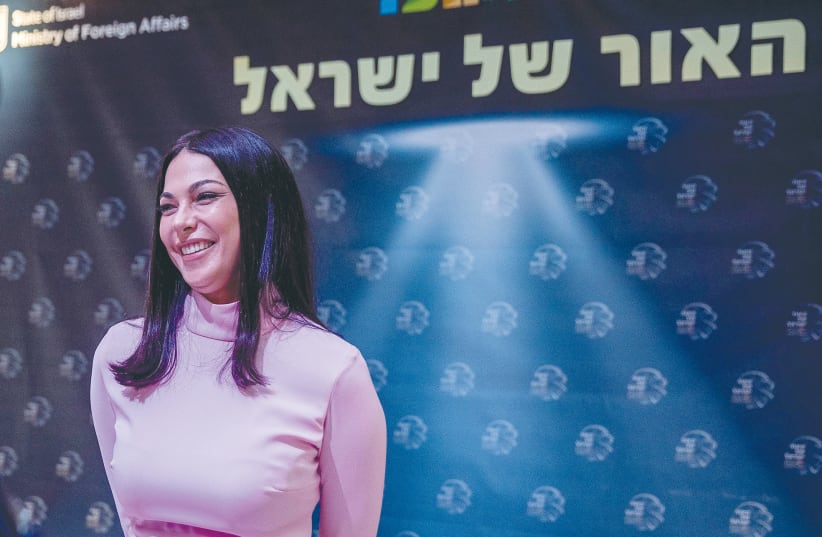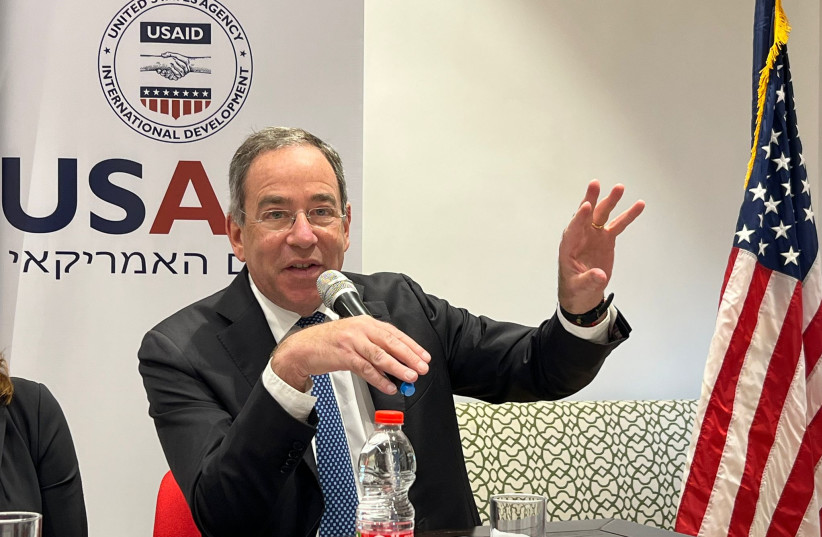■ SOME TWO and a half years ago, actress and model Moran Atias forsook the glare and glitter of Hollywood to return home and volunteer in the Coronavirus Ward at Ichilov Hospital in Tel Aviv. This week, she was back at Ichilov as a patient – not to be treated for any illness but to give birth to a daughter. Though romance has never eluded the beautiful and statuesque Atias, apparently no man had sufficient appeal for her to want to spend the rest of her life with him. However, her biological clock was ticking away, and she very much wanted to be a mother. Thanks to modern medical technology, she was able to realize her dream, and at age 41, gave birth on Wednesday of this week.
Remembering American, Canadian olim who died in Israel's wars
■ US AMBASSADOR Tom Nides and Canadian Ambassador Lisa Stadelbauer are scheduled to attend the annual Memorial Ceremony honoring American and Canadian immigrants who fell in Israel’s wars. The ceremony will take place at the memorial site of the Americans and Canadians in Israel in the Rabin Forest near Sha’ar Hagai Junction on Sunday, October 2 at 4.15 p.m. For those who wish to view the ceremony, but are unable to attend, a Zoom link will be listed on the AACI e-newsletter which is sent to AACI members. The featured speaker at the event is Esther Lapian who has taught teachers how to teach Bible and Jewish studies. She will speak about Mourning and Remembrance, using three Biblical tales with which to illustrate her remarks.
Sukkot Storyteller's Festival
■ JUST AROUND the chronological corner is the annual Sukkot Storytellers’ Festival, which has been going for more than a quarter of a century without loss of popularity because almost everyone likes to hear a good story. Actor and author Yossi Alfi – founder and moderator of the series – presents the evolution of the State of Israel through the incoming migratory forces that have contributed to its defense, its culture, its education, its economy, its medical and scientific achievements and more. Alfi who is predisposed to his native Iraq brings on groups of new and veteran immigrants from almost every country in Europe, and the Middle East, as well as from Ethiopia, and has them tell his or her story including details about parents and grandparents. Even though he’s an Iraqi-born Israeli, Alfi speaks Yiddish quite fluently – with a Lithuanian accent and pronunciation; and Yiddish figures in the program every year.
On Monday, October 19, at 7.30 p.m. Alfi will moderate a session about Yiddish with, among others, actor, singer, and collector of Yiddish books and newspapers Mendy Kahan, who founded the Yung Yidish multidisciplinary cultural organization and Shmulik Atzmon, the nonagenarian founder together with the late Mayor of Tel Aviv Shlomo Lahat of the Yiddishpiel Theater, which continues to attract full house audiences. Atzmon, a Holocaust survivor, used to be part of the Yiddish-speaking comedy trio The Three Shmuliks with partners Shmuel Rodensky and Shmulik Segal. Atzmon frequently mentions the time when Yiddish was illegal in Israel because David Ben-Gurion wanted to create a melting pot society in which everyone spoke Hebrew. Atzmon still carries around the notice advising the illegality of Yiddish.
Ben-Gurion, who was himself a fluent Yiddish speaker, would be amazed to discover how many people flock to Yiddish courses at Shalom Aleichem House, Tel Aviv University and places elsewhere because they want to read Yiddish literature in the original.
Jerusalem's Great Synagogue closed their doors to Jews on Rosh Hashanah
■ IF SOME of the Ukrainian and Russian refugees and new immigrants who have arrived in Jerusalem were anticipating spending their first Rosh Hashanah in the country at the capital’s Great Synagogue and listening to a sermon by Chief Rabbi David Lau, they were in for a disappointment. Security guards at the entrance to the Great Synagogue, would not allow anyone in if they did not have a ticket.
This is unfortunately common practice in some diaspora communities but it has not been the case with the Great Synagogue, where on the High Holy Days, additional chairs were brought in by management, to accommodate members of the public who just happened to wander in.
Who could imagine that a synagogue in Jerusalem, the Holy City, would close its doors to any Jew?
Fortunately, Heichal Shlomo, the former seat of the Chief Rabbinate is next door to the Great Synagogue, and three separate services were being held there. One was that of the regular Kehilat Renanim congregation whose permanent synagogue is in the building. Another was a large group of people from abroad, who conducted their own service and another on the fourth floor, was that of Chabad of Rehavia and Nahlaot whose director Rabbi Yisroel Goldberg had published notices on social media and elsewhere, with the heading “We saved a seat for you.” He also added that there was no charge. All three services were lively, aided by the excellent Heichal Shlomo acoustics.
Admittedly people who may have wanted to hear the impressive Great Synagogue choir, but took one of the Heichal Shlomo options, still had beautiful music with the difference that it was spontaneous, unrehearsed and came not only from the throat but from the gut.
Incidentally, Goldberg, whose own somewhat smaller synagogue, is only three doors away from Heichal Shlomo, also makes use of Heichal Shlomo for his annual community Seder at Passover.
Secularists in the capital who are fearful of a haredi takeover when municipal elections are held in October next year can breathe easy. Motorized traffic on Rosh Hashanah was almost as heavy as on a regular weekday, with the exception that there were no buses.
Interviewing Jerusalem mayor and opposition leader
■ STILL ON the subject of Jerusalem, the city’s Mayor Moshe Lion, and opposition leader Ofer Berkowitz were among people interviewed by the local publication Kol Ha’Ir and asked who they would like to have at their Rosh Hashanah table. Lion said that he would like to have legendary mayor Teddy Kollek because he believed that they could do great things together.
Berkowitz also chose someone no longer in the land of the living – Rabbi Abraham Isaac Kook, but didn’t stop with him. He also named David Ben-Gurion and Menachem Begin. It was known that the two men despised each other. Perhaps Rabbi Kook would have made peace between them.
Czestochowa Ghetto in Poland
■ TWO MEN met by chance in a Herzliya liquor store, and as so often happens when customers are waiting their turn, they struck up a conversation and discovered that each of them had roots in Czestochowa, Poland. What was particularly unusual was that neither of them is Ashkenazi. The men met again on several occasions, and in the course of time, learned that unlike other Polish towns and cities whose Jewish communities were decimated or exterminated during the Holocaust, there is no street or even an alleyway in Israel to commemorate the 40,000-strong Jewish community of Czestochowa that once was and is no more.
So the two men decided to take matters into their own hands. A ceremony to commemorate the 80th anniversary of the liquidation of the Czestochowa Ghetto was originally scheduled for October 8, but a new date will soon be announced.
The sixth and final transport that took Jews from the Czestochowa Ghetto to the Treblinka death camp, left on October 8, 1942.
The two men who had met in the Grappa Liquor store conceived a private initiative to remind future generations of a once-thriving Jewish community that had all the institutional amenities of any active Jewish community.
They will put up a memorial plaque in the alleyway behind the Grappa liquor store at 35 Ilanot Street, Herzliya.
It should be remembered that the Israel Philharmonic Orchestra owes its existence to Czestochowa-born violin virtuoso Bronislaw Huberman, who founded it in order to save Jewish musicians in Europe from the clutches of the Nazis.
The impressive Czestochowa Philharmonic Orchestra building on a former synagogue site in his hometown has been named for him and funds for the construction of the building were provided by American-based philanthropist Sigmund Rolat, who was born in Czestochowa. A Holocaust survivor, he has provided generously for Jewish memorial projects in Czestochowa and was also among the major donors who enabled the construction of Polin, the Museum of the History of Polish Jews.
This year marks the 140th anniversary of Huberman’s birth and the 75th anniversary of his death. Within this anniversary context, the Czestochowa Philharmonic decided to make 2022 Bronislaw Huberman year and to establish the European Bronislaw Huberman award. During a recent visit to the US by the Mayor of Czestochowa, the director of the orchestra and a prominent member of the city council, the award was conferred for the first time and the recipient was obviously Rolat.
Polish documentary showing
■ NOT SPECIFICALLY related to Czestochowa is the Polish documentary film Edge of Light made in 2021, featuring Dariusz Popiela, an Olympic slalom canoeist and world championship medalist, who together with a group of young Polish students, works to restore old forgotten Jewish cemeteries to honor the memory of people murdered in the Holocaust. The group tries to fix damaged tombstones, clears away debris and does all that is possible to restore the dignity of Jewish final resting places. The documentary will be screened on Wednesday, October 26 at 7.30 p.m. in the auditorium of the Kibbutz Lochamei HaGetaot Museum.
The film, which includes personal and collective narratives, will be screened in the presence of Popiela, who with the help of the Polish Embassy has been brought to Israel by the Mate Asher regional council in cooperation with that of Czarny Doniec, a village in south Poland.
For an invitation to the screening, contact Yael Rusek at the Polish Embassy in Tel Aviv, yael.rusek@msz.gov.pl
greerfc@gmail.com

